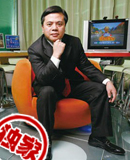09年12月英语六级模拟试卷及解析之七(文都)(6)
Part Ⅲ Listening Comprehension(听力原文在光盘中)
Tape Script of Listening Comprehension
Section A
Directions: In this section, you will hear 8 short conversations and 2 long conversations. At the end of each conversation, one or more questions will be asked about what was said. Both the conversation and the questions will be spoken only once. After each question there will be a pause. During the pause, you must read the four choices marked A), B), C) and D), and decide which is the best answer. Then mark the corresponding letter on Answer Sheet 2 with a single line through the center。
11. W: We are informed that the 11:30 train is late again。
M: Why did the railway company even bother to print a schedule?
Q: What do we learn from the conversation?
12. M: I’ve been waiting all week for this concert. The performance is said to be excellent. And with our student discount, the tickets will be real cheap。
W: Ah ah…I’m afraid I left my student ID card in the dorm。
Q: What does the woman imply?
13. W: Renting the conference room at the hotel will cost us too much. We’re already running in the red。
M: How about using our dining room for the meeting?
Q: What’s worrying the woman?
14. M: After high school, I’d like to go to college and major in business administration. I really like power and enjoy telling people what to do。
W: You’re very ambitious. But I’d rather spend my college days finding out what children are interested in. Child’s psychology is for me。
Q: What do we learn from the conversation?
15. W: I just made a jar of jam this morning and now I can't find it any where. Do you know what happened to it?
M: Did you hear a crash, that was it, I'm just as clumsy as ever。
Q: What is the problem?
16. W: I read in the newspaper that the novel you are reading is excellent。
M: I've also read some negative reviews。
Q: What can be learned from the conversation?
17. W: John told me he had got a second-hand car, do you know how much he paid for it?
M: Well, he said he paid 800 dollars for it. I think he got a real bargain。
Q: What does the man think of the price of the car?
18. M: Hello, this is doctor Marita from the emergency department. I have a 70-year-old patient with a fractured ankle。
W: OK, send him toward 3.
Q: What are they talking about on the phone?
Now you’ll hear two long conversations。
Conversation One
M: Hi. Uh, haven't we met before? You look so familiar。
W: Yeah. We met on campus last week, and you asked me the same question。
M: Oh, oh really? I'm sorry, but I'm terrible with names. But, but, but . . . Let me guess. It's Sherry, right?
W: No, but you got the first letter right。
M: I know, I know. It's on the tip of my tongue. Wait. Uh, Sandy, Susan. Wait, wait. It's Sharon。
W: Yeah. You got it . . . and only on the fourth try。
M: So, well, Sh . . ., I mean Sharon. How are you?
W: Not bad. And what was your name?
M: It's Ben, but everyone calls me B.J. And, uh, what do you do, Sh . . . Sharon?
W: I'm a graduate student majoring in TESL。
M: Uh, TESL . . . What's that?
W: It stands for Teaching English as a Second Language. I want to teach English to non-native speakers overseas。
M: Hey, that's sound really exciting. And do you need some type of specific degree or experience to do that?
W: Well, most employers overseas are looking for someone who has at least a Bachelor's degree and one or two years of experience. And what do you do? Are you a student on campus?
M: Yeah, but, uh . . . I guess I'm thinking of the idea of going into accounting or international business, but I guess I'm now leaning towards a degree in marketing。
W: Oh, uh . . . Well, I have to run. I have a class in ten minutes。
M: Oh, okay. And, uh, by the way, there's this, uh, dance on campus at the student center tonight, and I was wondering if you'd . . . you know . . . like to come along。
W: Oh really? Well, perhaps . . 。
M: Okay, well, bye。
Questions 19 to 22 are based on the conversation you have just heard。
19. Where did the man and woman first meet?
20. What’s the woman’s name?
21. What major is the man considering most at this time?
22. Do you think the woman is interested in going out with the man?
Conversation Two
W: Mike, any plans for the summer vacation?
M: I want to travel, but haven’t decided where to go yet. Any suggestion?
W: Last year I went to Lugu Lake。
M: Lugu Lake? Where is it?
W: It is situated in the center of Ningliang Yi Autonomous County, in northwest Yunnan。
M: How was it?
W: Well, wonderful scenery, also its unique Mosuo culture. You must be interested, since you major in Chinese culture。
M: Yes, I am. How to get there?
W: I got there from Kunming. I took a sleeper bus at 16:00 and got to Ningliang about 10:00 in the morning. The trip is 620km and the fare is around RMB130.
M: That’s great. Kunming is a beautiful city. I long to go there too. Any other places worth going to?
W: Well, there are so many natural wonders in China. Besides Lugu Lake, I have also been to Kanasi Lake, a gorgeous lake 1,374 meters high above sea level. It’s near Urumuqi。
M: But Urumuqi is too far away from Kunming。
W: Oh, Detian Waterfall in Guangxi! You will like it, near Yunnan。
M: I love waterfall. I once went to Niagara Falls, fantastic。
W: Yes, Detian Waterfall is the second largest trans-national waterfall in the world, second only to the Niagara Falls on the US-Canadian border. You won’t regret going there。
M: Sure. You know, Chen, where I want to go most in China?
W: Tibet?
M: Almost right. Mount Everest。
W: Haha. As an ordinary traveler, it's probably better to use your imagination and enjoy it through pictures rather than actually going there。
Questions 23 to 25 are based on the conversation you have just heard。
23. Where is Lugu Lake?
24. What is Lugu Lake famous for, according to the passage?
25. How long did it take Chen to get to Lugu Lake from Kunming?
Section B
Directions: In this section, you will hear 3 short passages. At the end of each passage, you will hear some questions. Both the passage and the questions will be spoken only once. After you hear a question, you must choose the best answer from the four choices marked A), B), C) and D). Then mark the corresponding letter on Answer Sheet 2 with a single line through the center。
Passage One
Nearly a third of young people with disabilities have taken at least some postsecondary classes within the first two years after they leave high school. The study finds that disabled students over all are less than half as likely as their peers to have attended college in the two years after high school, but the college-going rate varies greatly by type of disability: students with hearing or visual problems are as likely as nondisabled students to have done some postsecondary work。
The study’s underlying purpose is to help gauge the success of federal laws and programs which ensures elementary and secondary schools to prepare disabled people for later life. But along the way, the study provides in-depth data about them。
The study looked at a group of students who were in high school in 2001 and who had finished or left high school two years later。
Of those, 31 percent of disabled students had attended a postsecondary institution since leaving high school. Nearly 20 percent of the students were attending college when the study was conducted, just under half of the proportion of the general population。
The study also finds that 67 percent of students with hearing problems and 69 percent of students with visual problems had attended some college since high school. Only one in five students with emotional disabilities had received some postsecondary education since they left high school。
Questions 26 to 28 are based on the passage you have just heard。
26. How long are the group of disabled people been traced in the study?
27. What is the proportion of the disabled against their peers attending college?
28. What is the purpose of the study?
Passage Two
American visitors to Eastern Asia are often surprised and puzzled by how Asian cultures and customs differ from those in the United States. What’s considered typical or proper social conduct in one country may be regard as odd, improper or even rude in the other. For example, people from some Eastern Asian countries may begin a conversation with a stranger by asking personal questions about family, home or work. Such questions are thought to be friendly, whereas they might be considered offensive in the United States. On the other hand, people in most Asian cultures are far more guarded about expressing their feelings publicly than most Americans are. Openly displaying annoyance or anger, yelling, arguing loudly and so forth is considered ill-mannered in countries such as Japan. Many Eastern Asians prefer to hold their emotions in check and instead express themselves with great politeness. They try not to be blunt and avoid making direct criticisms. In fact, they often keep their differences of opinion to themselves and merely smile and remain silent rather than engage in a confrontation. By comparison, Americans are often frank about displaying both positive and negative emotions on the street and in other public places. Americans visiting Asia should keep in mind that such behavior may cause offense. A major difference between American culture and most Asian cultures is that in Asia, the community is more important than the individual. Most Americans are considered a success when they make a name for themselves。
Questions 29 to 31 are based on the passage you have just heard。
29. How would some Asians start their conversation when they meet for the first time?
30. What would a Japanese do when he feels annoyed?
31. What is encouraged in American culture according to the passage?
Passage Three
Between ten and midnight the United States is politically leaderless -- there is no center of information anywhere in the nation except in the New York headquarters of the great broadcasting companies and the two great wire services. No candidate and no party can afford the investment on election night to match the news-gathering resources of the mass media; and so, as every citizen sits in his home watching his TV set or listening to his radio, he is the equal of any other in knowledge. There is nothing that can be done in these hours, for no one can any longer direct the great strike for American power; the polls have closed. Good or bad, whatever the decision, America will accept the decision -- and cut down any man who goes against it, even though for millions the decision runs contrary to their own votes. The general vote is an expression of national will, the only substitute for violence and blood. Its decision is to be defended as one defends civilization itself。
There is nothing like this American expression of will in England or France, India or Russia. Only one other major nation in modern history has ever tried to elect its leader directly by mass, free, popular vote. This was the Weimar Republic of Germany, which modeled its unitary vote for a national leader on the American practice. Out of its experiment with the system it got Hitler. Americans have had Lincoln, Wilson, two Roosevelt's. Nothing can be done when the voting returns are flooding in: the White House and its power will move to one or another of the two candidates, and all will know about it in the morning。
Questions 32 to 35 are based on the passage you have just heard。
32 What is the chief activity in the United States between ten and midnight of the day being discussed?
33. What is the attitude in the United States toward the decision which emerges from the two-hour period?
34. What was the only major modern nation in which a similar experience might have been felt by its citizens?
35. Who came into power from the experiment in the other nation?
Section C
Directions: In this section, you will hear a passage three times. When the passage is read for the first time, you should listen carefully for its general idea. When the passage is read for the second time, you are required to fill in the blanks numbered from 36 to 43 with the exact words you have just heard. For blanks numbered from 44 to 46 you are required to fill in the missing information. For these blanks, you can either use the exact words you have just heard or write down the main points in your own words. Finally, when the passage is read for the third time, you should check what you have written。
I asked successful people what the secret of their success was. I recall an early discussion with a vice president of a large oil company. “Oh, I just keep a To Do List,” he said. I passed over that quickly, little suspecting the importance of what he said。
I was in another city the next day and I had lunch with a businessman who practically owned the town. He was chairman of the gas and light company, president of five manufacturing companies, and had his hand in a dozen other enterprises. I asked him how he managed to get everything done. “Oh, that’s easy,” he said. “I keep a To Do List。” The first thing in the morning, he told me, he would come in and list what he wanted to accomplish that day. He would arrange the items in priority。
During the day he would cross off items and add others as they occurred to him. In the evening he would check to see how many of the items he had written down still remained undone and then give himself a score. His goal manages to cross off every single item。
Again and again in the years since, when I have talked to successful people, the To Do List has come up. I have found that one difference between people at the top of the ladder and people at the bottom is that those at the top use a To Do List every day to make better use of their time; those at the bottom don’t。
特别说明:由于各方面情况的不断调整与变化,新浪网所提供的所有考试信息仅供参考,敬请考生以权威部门公布的正式信息为准。






